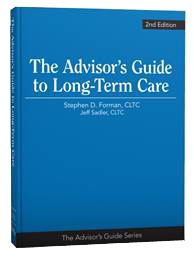Private Funding Options for Long Term Care
Many of us feel confident in our ability to save and invest should an accident or illness strike-- which is why this is the default long term care plan for so many Americans. But once people stop to consider the following, they usually re-assess this option:
- Will you have a separate, dedicated account set-up solely for LTC expenses? If not, when the insurable event occurs you'll have to cash-in assets. Capital gains, income taxes and potential surrender charges will all take a bite out of your returns. (LTC insurance benefits are received tax-free.)
- How liquid are your assets? Could you sell them quickly in a slow or declining market? Would you be willing to take a loss?
- Do you have alternative plans for your assets, such as generating retirement income or leaving an inheritance? You don't want to put yourself in the position of having to cash-in an asset that was meant for something else.
- If you do set aside money just for LTC costs, will you invest properly so there's sufficient funds available in 10, 15 or 20 years? You'll either have to set aside a large lump sum that you cannot touch, or invest conservatively to ensure the money will be there when you need it. (By purchasing LTC insurance, you liberate yourself to invest more aggressively and earn a higher return.)
- What if you can't save enough-- if your assets don't earn enough interest. What if you need care tomorrow? There's no guarantee you'll have a full 10 or 20 years to save.
- Will you get the care you need? When people pay out of their own pockets, they are less likely to get ample care, or to delay getting care, since they know they have to pay the entire cost. Self-insurers tend to put off invading their assets.
- Even though you may think you have enough to self-insure, what if you needed care for 5 to 7 years, as do many Alzheimer's patients? What effect would that have on your partner's retirement? If you paid out-of-pocket, would there be enough left over to pay for your partner's care?
Is self-insurance really a viable plan, or merely a necessity that replaces the lack of a plan?






